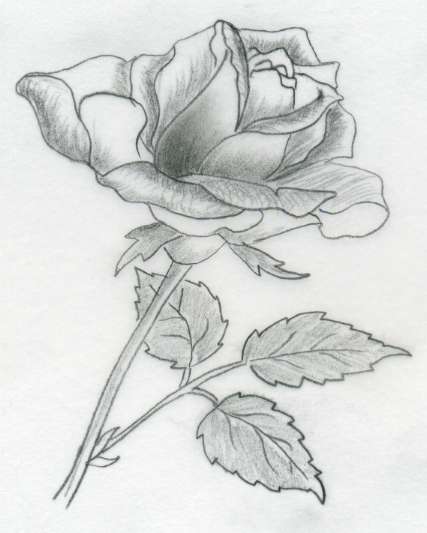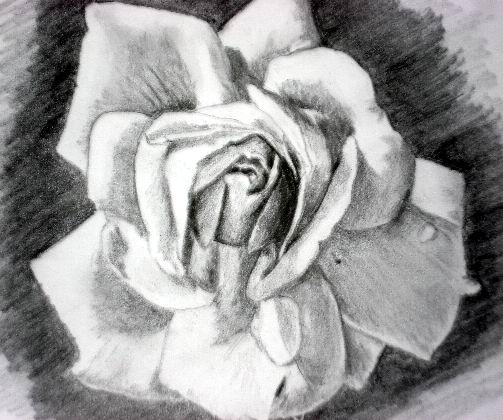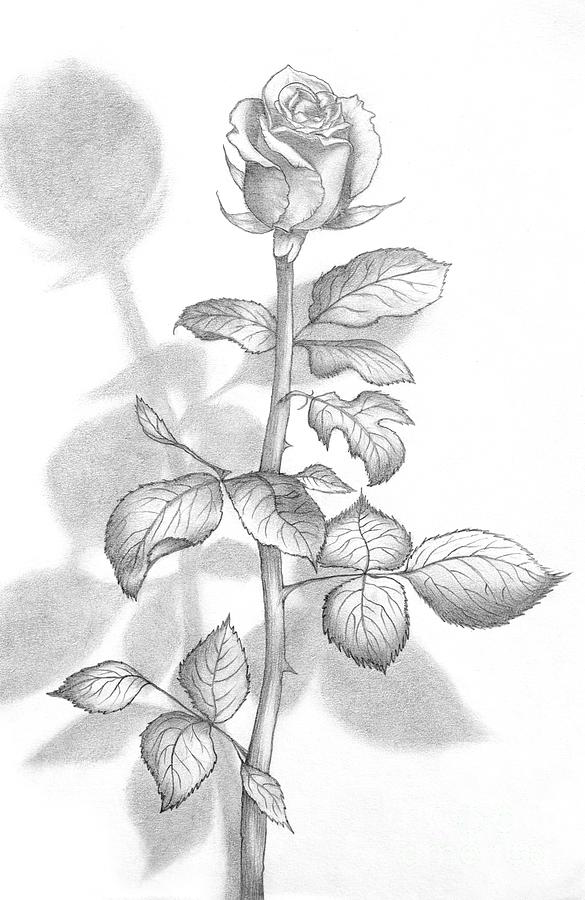Pencil Sketches Of Roses Biography
source(google.com.pk)Oswald Rose Campbell (1820-1887), artist, was born in Jersey, Channel Islands, son of Captain Rose Campbell and his wife Elizabeth, née Sutherland. At 19 he was admitted as a student of the Trustees' Academy in Edinburgh. In 1842 he went to London and entered the Royal Academy School on a studentship which lasted for ten years. In London he became a member of the National Institution of Artists, and claimed to have 'mixed with the first artists of the time'. In 1846 he studied for four months at the Liverpool Academy and then visited Dublin, where he was admitted to the life-school of the Royal Hibernian Academy. He exhibited twice with the Royal Academy, London: in 1847 'Christ and the two disciples journeying to Emmaus', and in 1848 an oil entitled 'The Prisoner'.
Campbell arrived in the Cossipore at Melbourne in October 1852. In 1854 he painted a view of 'Hobson's Bay from Flagstaff' (now in the Dixson Gallery, Sydney). He moved to Sydney where early in 1855 he did a portrait head of Mary Reibey. Three of his other works in New South Wales are extant: a portrait of John Portus, Morpeth, 1860 (now in the Newcastle City Art Gallery); 'Sydney Cove from Kirribilli', 1861; and a pencil sketch of gums at Richmond, 1861. He returned to Melbourne in 1864 and settled first at East Melbourne and then at Woodend House, Punt Road, Windsor. His first application for the post of drawing-master at the School of Design in the Melbourne National Gallery was unsuccessful. In an Exhibition of Ornamental and Decorative Art, held at the Melbourne Public Library from March to June 1869, he was represented by an oil painting, 'Absent Thoughts'. In 1870 he became the first president of the newly-founded Victorian Academy of Arts and at its first exhibition showed several works, oils of a moral-biblical nature, a model for a seal of the public library, and 'Man with the Muck-rake', illustrating Bunyan, which appeared as an engraving in the Illustrated Australian News, 2 January 1871. Still president in 1872, at the second exhibition he contributed two views and an oil illustrating a scene from literature: 'The arrest of Hastings in the Tower of London', from Richard III. After some disagreement with the council of the academy he retired as president but in December 1875 accepted a life membership and continued as an exhibitor until 1882. He also won an award for his pictures at the Philadelphia Exhibition in 1875.
On Thomas Clark's retirement, Campbell applied again for appointment as drawing-master at the School of Design, claiming that for the past twelve years he had been drawing on wood, chiefly figures for the illustrated papers. He was appointed on 1 December 1876 at a salary of £250. In his régime of nine years he appears to have been rather inflexible and dictatorial, following strict academic lines. In 1879-80 he was the central figure in a controversy over a life-class on Saturday afternoons organized by some of his students; the ring leaders were Tom Roberts, Frederick McCubbin and Charles Richardson. Because of Campbell's opposition several students were threatened with dismissal, but they appealed to the trustees and were allowed to stay. Called to explain his actions, Campbell wrote to the trustees on 20 June 1879 defending his teaching and asserting that his pupils were not yet ready for anything beyond drawing, anatomy, perspective and modelling, and that they abused the freedom granted to them. He was supported by the majority of his pupils, and their letters in praise of his teaching-methods seem to have reinstated him with the trustees, but the rebels won the right to have a life-class at which Campbell was expected to teach.
In 1882 Campbell was embroiled in another controversy at the gallery over fees, which students had to pay to him directly for his tutoring, and to the painting-master, George Folingsby, for his classes, instead of a general fee covering all tuition. By this time Campbell's health was beginning to fail; in January 1886 the trustees notified him that he was to be replaced. His successor was Frederick McCubbin. Campbell died at Woodend House, Punt Road, on 18 March 1887, aged 67 and was buried in the St Kilda cemetery. In England he had married Eleanor, née Scott. Of their nine children a son, Malcolm Alexander (1851-1889), became an artist, exhibited in the Victorian Academy in 1872-87 and served on its council in 1881-84.
Select Bibliography
A. Graves, The Royal Academy of Arts, vol 1 (Lond, 1905)
E. La T. Armstrong, The Book of the Public Library, Museums, and National Gallery of Victoria: 1856-1906 (Melb, 1906)
Public Library, Museums & National Gallery of Victoria, Trustees Report, Votes and Proceedings (Legislative Assembly, Victoria), 1880-85
National Gallery of Victoria, Letters, box 9, and drawing-master applications 1868-70 (Public Record Office Victoria)
Victorian Artists' Society, papers and letters (State Library of Victoria).
Dame Emilie Rose Macaulay, DBE (1 August 1881 – 30 October 1958) was an English writer. She published thirty-five books, mostly novels but also biographies and travel writing.
Contents [hide]
1 Early years and education
2 Career
3 Personal life
4 Memorable quotes
5 Bibliography
6 References
7 External links
Early years and education[edit source]
Macaulay was born in Rugby, Warwickshire the daughter of George Campbell Macaulay, a Classical scholar, and his wife, Grace Mary (née Conybeare). Her father was descended in the male-line directly from the Macaulay family of Lewis. She was educated at Oxford High School for Girls and read Modern History at Somerville College at Oxford University.
Career[edit source]
Macaulay began writing her first novel, Abbots Verney (published 1906), after leaving Somerville and while living with her parents at Ty Isaf, near Aberystwyth, in Wales. Later novels include The Lee Shore (1912), Potterism (1920), Dangerous Ages (1921), Told by an Idiot (1923), And No Man's Wit (1940), The World My Wilderness (1950), and The Towers of Trebizond (1956). Her non-fiction work includes They Went to Portugal, Catchwords and Claptrap, a biography of Milton, and Pleasure of Ruins. Macaulay's fiction was influenced by Virginia Woolf and Anatole France. [1]
During World War I Macaulay worked in the British Propaganda Department, after some time as a nurse and later as a civil servant in the War Office. She pursued a romantic affair with Gerald O'Donovan, a writer and former Jesuit priest, from 1918 until his death in 1942. During the interwar period she was a sponsor of the pacifist Peace Pledge Union; however she resigned from the PPU and later recanted her pacifism in 1940. [2] Her London flat was utterly destroyed in the Blitz, and she had to rebuild her life and library from scratch, as documented in the semi-autobiographical short story, Miss Anstruther's Letters, which was published in 1942.
The Towers of Trebizond, Macaulay's final novel, is generally regarded as her masterpiece. Strongly autobiographical, it treats with wistful humour and deep sadness the attractions of mystical Christianity, and the irremediable conflict between adulterous love and the demands of the Christian faith. For this work, she received the James Tait Black Memorial Prize in 1956.
Personal life[edit source]
Rose Macaulay was never a simple believer in "mere Christianity"; however, and her writings reveal a more complex, mystical sense of the divine. That said, she did not return to the Anglican church until 1953; she had been an ardent secularist before and, while religious themes pervade her novels, previous to her conversion she often treats Christianity satirically, for instance in Going Abroad and The World My Wilderness.
Macaulay never married, as a result of her lengthy and secret relationship with the married Irish novelist Gerald O'Donovan. They met in 1918 and the affair lasted till O'Donovan's death in 1942.[3]
She was created a Dame Commander of the Order of the British Empire (DBE) on 31 December 1957 in the 1958 New Years Honours.[4] Macaulay was an active feminist throughout her life. [1]
She died on 30 October 1958, aged 77.
Memorable quotes[edit source]
From The Towers of Trebizond:
"Adultery is a meanness and a stealing, a taking away from someone what should be theirs, a great selfishness, and surrounded and guarded by lies lest it should be found out. And out of meanness and selfishness and lying flow love and joy and peace beyond anything that can be imagined."
First line of The Towers of Trebizond, cited by librarian Nancy Pearl in "Famous First Words: A Librarian Shares Favorite Literary Opening Lines," [1] hosted by Steve Inskeep on NPR's Morning Edition, September 8, 2004, as an example among "some notable opening lines that have made Pearl's heart pound".
"Take my camel, dear," said my Aunt Dot, as she climbed down from this animal on her return from High Mass.
From Staying with Relations. Discussing the coat worn by a visitor, a character remarks:
"Is rabbit fur disgusting because it's cheap, or is it cheap because it's disgusting?"
Bibliography[edit source]
Primary: Fiction:
Abbots Verney (1906)
The Furnace (1907)
The Secret River (1909)
The Valley Captives (1911)
Views and Vagabonds (1912) John Murray
The Lee Shore (1913) Hodder & Stoughton
The Two Blind Countries (1914) Sidgwick & Jackson
Non-Combatants and Others (1916) Hodder & Stoughton
What Not: A Prophetic Comedy (1918)
Three Days (1919) Constable
Potterism (1920) US Edition Boni and Liveright
Dangerous Ages (1921) US Edition Boni and Liveright
Mystery At Geneva: An Improbable Tale of Singular Happenings (1922) William Collins Sons & Co. Ltd; US Edition Boni and Liveright
Told by an Idiot (1923)
Orphan Island (1924) William Collins Sons & Co. Ltd; US Edition Boni and Liveright
Crewe Train (1926)
Keeping Up Appearances (1928) William Collins Sons & Co. Ltd
Staying with Relations (1930)
They Were Defeated (1932)
Going Abroad (1934)
I Would Be Private (1937)
And No Man's Wit (1940)
The World My Wilderness (1950) William Collins Sons & Co. Ltd
The Towers of Trebizond (1956) William Collins Sons & Co. Ltd
Primary: Non-Fiction:
A Casual Commentary (1925)
Some Religious Elements in English Literature (1931)
Milton (1934)
Personal Pleasures (1935)
The Minor Pleasures of Life (1936)
An Open Letter (1937)
The Writings of E.M. Forster (1938)
Life Among the English (1942)
Southey in Portugal (1945)
They Went to Portugal (1946)
Evelyn Waugh (1946)
Fabled Shore: From the Pyrenees to Portugal By Road (1949)
Pleasure of Ruins (1953)
Coming to London (1957)
Letters to a Friend 1950-52 (1961)
Last letters to a friend 1952-1958 (1962)
Letters to a Sister (1964)
They Went to Portugal Too (1990) (The second part of They Went to Portugal, not published with the 1946 edition because of paper restrictions.)
Secondary Literature:
Babington Smith, Constance (1972). Rose Macaulay. London: Collins. ISBN 0-00-211720-7.
Bensen, Alice R. (1969). Rose Macaulay. New York: Twayne Publishers.
Crawford, Alice (1995). Paradise Pursued: The Novels of Rose Macaulay. Madison, N.J.: Fairleigh Dickinson University Press. ISBN 0-8386-3573-3.
Emery, Jane (1991). Rose Macaulay: A Writer's Life. London: J. Murray. ISBN 0-7195-4768-7.
Fromm, Gloria G. (October 1986). "The Worldly and Unwordly Fortunes of Rose Macaulay". The New Criterion 5 (2): 38–44.
Hein, David. “Faith and Doubt in Rose Macaulay’s The Towers of Trebizond.” Anglican Theological Review 88 (2006): 47–68. Abstract: http://www.anglicantheologicalreview.org/read/article/508/
Hein, David. "Rose Macaulay: A Voice from the Edge." In David Hein and Edward Henderson, eds., C. S. Lewis and Friends: Faith and the Power of Imagination, 93–115. London: SPCK; Eugene, OR: Cascade, 2011.
LeFanu, Sarah (2003). Rose Macaulay. London: Virago.
Moore, Judith (November 15, 1978). "Rose Macaulay: A Model for Christian Feminists". Christian Century 95 (37): 1098–1101.
Passty, Jeanette N. (1988). Eros and Androgyny: The Legacy of Rose Macaulay. London and Toronto: Associated University Presses. ISBN 0-8386-3284-X.
Martin Ferguson Smith (ed), Dearest Jean: Rose Macaulay’s letters to a cousin (Manchester, Manchester University Press, 2011).
References[edit source]
^ Jump up to: a b Stanley J. Kunitz and Howard Haycraft, editors; Twentieth Century Authors, A Biographical Dictionary of Modern Literature, (Third Edition). New York, The H.W. Wilson Company, 1950 (865-66).
Jump up ^ Martin Ceadel, Semi-Detatched Idealists:The British Peace Movement and International Relations, 1854-1945. Oxford University Press, 2000 ISBN 0199241171 (p.361).
Jump up ^ Guardian
Jump up ^ London Gazette notice of Macaulay's damehood
External links[edit source]
Works by Rose Macaulay at Project Gutenberg
Speaker Icon.svg Dame Rose Macaulay public domain audiobooks from LibriVox
Works by or about Rose Macaulay in libraries (WorldCat catalog)
Archival material relating to Rose Macaulay listed at the UK National Archives
Pencil Sketches Of Roses Of Nature Of Sceneries Landscapes Of Flowers Of Girls Of People Tumblr Of Roses Of Eyes Of Love

Pencil Sketches Of Roses Of Nature Of Sceneries Landscapes Of Flowers Of Girls Of People Tumblr Of Roses Of Eyes Of Love
Pencil Sketches Of Roses Of Nature Of Sceneries Landscapes Of Flowers Of Girls Of People Tumblr Of Roses Of Eyes Of Love

Pencil Sketches Of Roses Of Nature Of Sceneries Landscapes Of Flowers Of Girls Of People Tumblr Of Roses Of Eyes Of Love

Pencil Sketches Of Roses Of Nature Of Sceneries Landscapes Of Flowers Of Girls Of People Tumblr Of Roses Of Eyes Of Love

Pencil Sketches Of Roses Of Nature Of Sceneries Landscapes Of Flowers Of Girls Of People Tumblr Of Roses Of Eyes Of Love

Pencil Sketches Of Roses Of Nature Of Sceneries Landscapes Of Flowers Of Girls Of People Tumblr Of Roses Of Eyes Of Love

Pencil Sketches Of Roses Of Nature Of Sceneries Landscapes Of Flowers Of Girls Of People Tumblr Of Roses Of Eyes Of Love

Pencil Sketches Of Roses Of Nature Of Sceneries Landscapes Of Flowers Of Girls Of People Tumblr Of Roses Of Eyes Of Love

Pencil Sketches Of Roses Of Nature Of Sceneries Landscapes Of Flowers Of Girls Of People Tumblr Of Roses Of Eyes Of Love

Pencil Sketches Of Roses Of Nature Of Sceneries Landscapes Of Flowers Of Girls Of People Tumblr Of Roses Of Eyes Of Love

Pencil Sketches Of Roses Of Nature Of Sceneries Landscapes Of Flowers Of Girls Of People Tumblr Of Roses Of Eyes Of Love


Pencil Sketches Of Roses Of Nature Of Sceneries Landscapes Of Flowers Of Girls Of People Tumblr Of Roses Of Eyes Of Love

Pencil Sketches Of Roses Of Nature Of Sceneries Landscapes Of Flowers Of Girls Of People Tumblr Of Roses Of Eyes Of Love

Pencil Sketches Of Roses Of Nature Of Sceneries Landscapes Of Flowers Of Girls Of People Tumblr Of Roses Of Eyes Of Love


Pencil Sketches Of Roses Of Nature Of Sceneries Landscapes Of Flowers Of Girls Of People Tumblr Of Roses Of Eyes Of Love

Pencil Sketches Of Roses Of Nature Of Sceneries Landscapes Of Flowers Of Girls Of People Tumblr Of Roses Of Eyes Of Love

No comments:
Post a Comment